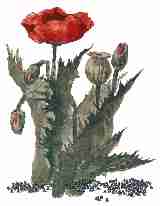Law enforcement officials say some elderly patients are selling their prescription drugs. Rx for pain, or jail?
So, who is buying drugs from senior citizens? Anyone from first-time-user high school students to hardened drug addicts desperate for a fix, investigators say.
More and more elderly Kentucky residents are being arrested due to Operation UNITE, an Appalachia-based antidrug initiative launched in 2003, according to the Lexington Herald-Leader newspaper.
Dealing With Bills?
"When a person is on Social Security, drawing $500 a month, and they can sell their pain pills for $10 apiece, they'll take half of them for themselves and sell the other half to pay their electric bills or buy groceries," Kentucky jailer Roger Webb recently told reporters.
And, some suspect that the problems in Kentucky may be mirrored elsewhere in the country. Why is this happening? Seniors, they say, need ways to raise money for living expenses that they otherwise can't afford. Monthly checks from the government just won't cut it.
In Bellaire, Ohio, for example, one 65-year-old man was arrested in November after authorities said he sold undercover officers $350 worth of Percocet pills. The man, who is currently in jail pending a court hearing, said he was just looking for a way to pay for his wife's medical bills. His wife has multiple sclerosis.
But, despite their age and struggles, seniors convicted of drug trafficking could face years in prison.
No Pain, No Gain?
The most commonly abused prescription drugs include opioids (like OxyContin), which are used to treat pain; central nervous system depressants (like valium and Xanax), used for anxiety and sleep disorders; and stimulants (like Dexedrine and Ritalin), used for conditions like obesity and Attention Deficit Hyperactivity Disorder (ADHD), according to the National Institute on Drug Abuse, a part of the National Institutes of Health.
The agency says these drugs can be both highly addictive and potentially harmful.
"The nonmedical use or abuse of prescription drugs is a serious and growing public health problem in this country," said NIDA director Nora Volkow, M.D., in a report on the subject.
"Most people take prescription medications responsibly; however, an estimated 48 million people have used prescription drugs for nonmedical reasons in their lifetimes. This represents approximately 20 percent of the U.S. population."
"NIDA hopes to decrease the prevalence of this problem by increasing awareness and promoting additional research on prescription drug abuse. Prescription drug abuse is not a new problem, but one that deserves renewed attention," Volkow said.
Uncommon Problem
William Rice, M.D., myDNA's chief medical officer, says although there are reports of elderly drug trafficking, people must remember that this situation is rare.
"In discussing this unusual problem, it is important to remember that 99.99 percent of seniors are not involved in illegal trafficking of medicine," he says.
"The fact that a very few seniors are involved in this activity does not suggest that this measurably contributes to the bigger issue of illegal drug use in this country," Rice says.
Refs
HOME
Glossary
Opium Images
Opium Timeline
Meet The Family
Wirehead Hedonism
Off-shore Pharmacies
The War On Painkillers
UK News: Heroin on the NHS
The Birth of a New Generation
Buying drugs without a prescription
Legalise Heroin Says Former Police Chief
Mexico Decriminalises Personal Heroin Use
Why Americans Buy Cheap Pain Meds Abroad
McLean Doctor Facing Drug Trafficking Charges
Prescription Drug Abuse and the Bush Whitehouse
Unannounced DEA withdrawal of guidelines on painkillers
Does Canadian drug policy leave thousands of pain patients in agony?
Victims or criminals? Chronic pain patients and the doctors who treat them
